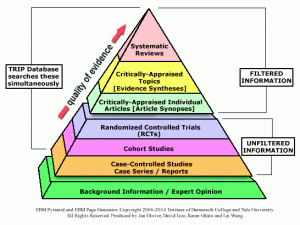If evidence-based medicine was to be compared to a fashion show, the Institute for Evidence-based Practice for Medical Librarians would be its “Fashion Week.” Down its runway tailored study designs and structured clinical questions went on display for the 37 participants to review and critique. The Institute, in its seventh year, has a new home at the University of Colorado in Denver. I was able to attend this year with the help of an NCNMLG professional development grant.

Held on the Anschutz Medical Campus in July, the library nicely accommodated our migrations to various rooms where small group learning sessions and one large group session and back again were staged over a 3-day period. Institute faculty members, some names very familiar to those of us in the Medical Library community (Connie Schardt among them), took turns imparting their expertise and creating an interactive atmosphere. They showed us all how to stitch together clinical questions using PICOTT and described why certain study designs made a better fit with specific clinical questions. But, that was but one of the items in the collection. Our stylists intended for us to also feast our eyes on and discover how to:
- Identify and explain the concepts, issues and process of evidence-based clinical practice (EBCP).
- Recognize different types of study designs and understand their strengths and limitations.
- Create well-built, answerable clinical questions.
- Use clinical questions to find the best evidence in the literature about the the diagnosis and treatment of disorders.
- Identify and explain the criteria for judging the internal validity of randomized controlled trials (RCTs), systematic reviews, qualitative and diagnostic studies.
- Identify roles that librarians can undertake in providing EBCP training and support to health care professionals.
When we weren’t busy taking in evidence couture, we were stuffing down delicious snacks and lunches, all included in the price of registration. Our nights were filled with the sights and sounds of the mile-high city as well. One night we went downtown to a Mexican restaurant which gave us all a chance to mingle with our high-fashion friends. Another night we ate close to the University at a pub set-up with a digital system resembling a Jeopardy game-board. We lit up the night competing table-to-table for the right to claim our superior internalization of all things EBM-like.
On our last session together we were asked to describe how we could apply what we learned back at our respective workplaces. In the end we had some sixty different ways to use our newly outfitted knowledge base. As a matter of fact, I have a Webex in mind with a fellow Kaiser Permanente librarian where we will garment journal articles with evidence-based details.
Was the show a success? Would I recommend it to others interested in becoming more EBM savvy? A resounding YES!
For more information about evidence-based medicine concepts, see http://guides.mclibrary.duke.edu/ebmtutorial
For information on the course, it will be held again in Denver in 2015 – http://hslibraryguides.ucdenver.edu/content.php?pid=486227&sid=3987097
